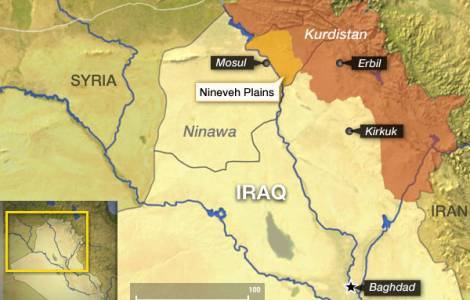Mosul – Nineveh provincial Council, with a resolution announced Tuesday, July 31, suspended the transfer of 450 Sunni Arab families in the areas of the Nineveh Plain, already authorized by the federal government, and requested that the family members in question are located in south and east areas of Mosul. The move was taken with the declared intention of preventing or at least restraining the process of alteration of the demographic balance in the Nineveh Plain, an area of traditional rooting of the Iraqi Christian communities and of religious minorities such as the Yazidis and the Shabaks. The stop to the transfer, claimed as a success of the Provincial Council by the local political exponent Ghazwan Hamid Hamid, is indicated as an expression of a new political sensibility aimed at putting pressure on the central government of Baghdad with the aim of avoiding someone taking advantage of the chaotic situation following the conflict with the so-called Islamic State to alter the demographic balance of that region, to the detriment of the traditionally established minority ethnic-religious communities.
In recent decades, the Sunni component in the north-Iraqi regions had increased following the demographic re-displacement policies pursued by the Ba’athist regime since the seventies. The current Iraqi Constitution has outlawed all policies implemented in a direct manner to alter the demographic composition of the different areas of the Country from an ethnic and religious point of view.
Local and national politicians from the Nineveh Plain have expressed their intention to implement all legal initiatives – including street demonstrations – to push the government of Baghdad to avoid measures that end up penalizing minority religious communities in areas of their traditional settlement, pushing them to emigrate.
There is a slow and not an easy return of many Christian families in the Nineveh province, who had left their homes and villages between June and August since 2014, before the advance of Daesh militiamen. Just over a year ago, as reported by Fides (see Fides 21/7/2017), the Chaldean Patriarchate had denounced the “attempt to put a hand on the towns of the Nineveh Plain, through public or concealed struggles”, that “have a negative influence on the native people of this land”. At that time, the Niniveh Plain also appeared as a kind of “controversial area”, around which geopolitical games such as the possible, future proclamation of independence of the autonomous region of Iraqi Kurdistan are played.
Agenzia Fides






